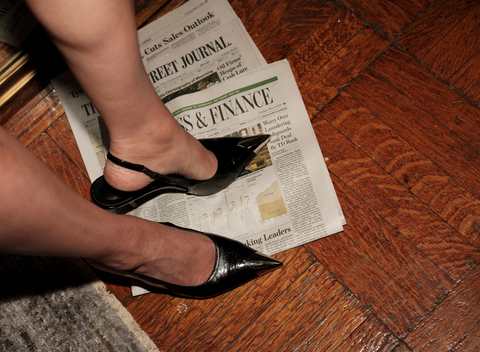
Let's Unpack the Three Subtle Money Beliefs That Are Holding You Back
At this very moment, your behavior is subtly, yet powerfully, being driven by beliefs you don't even know you hold. Beneath our conscious thoughts, a staggering amount of processing takes place in our subconscious minds. While the conscious brain can only process around 40 bits of information per second, its subconscious counterpart churns through an astonishing 11 million bits!
Here's the thing: subconscious beliefs don't just spring out of thin air. All sorts of things shape them — what we see, our culture, messages in the media, or things hinted at in our daily lives. It's a subtle game, and it's always at play. It influences how we think, react, and even how we feel. Surprisingly, these beliefs are essentially sealed in an impenetrable vault by age seven.
With this as our starting point, let's delve into three tricky money beliefs that so many of us are unknowingly carrying and acting out. This is your opportunity to reveal and flip these sticky beliefs, putting you on a more direct path to more money while unearthing the you who has been there beneath these unseen beliefs all along.
Subconscious Priming: The Hidden Puppet Master
First off, let's discuss subconscious priming, which plays a surprisingly big role in our financial lives. Picture it as a hidden puppet master, pulling the strings behind your financial decisions without you even realizing it. Sounds sneaky, right? Well, let's dig a little deeper.
Consider the landmark study by Spencer, Steele, and Quinn (1999) which concluded that if women are subconsciously reminded of the negative stereotypes about their math abilities, their test scores suffer, regardless of their real skills.
Secondly, women tend to see financial sectors as areas more suitable for men, a thought pushed by society's gender norms. This belief has been affirmed by research, such as a study by Gupta and Bhawe (2007) which found that these underlying stereotypes can deter women from pursuing financial careers or even confidently managing their personal finances.
Finally, although it seems to defy logic, the way we view money and our worthiness to attain it is also largely shaped subconsciously. A 2018 study by Klontz and Lurtz showed that women who grew up in households where money was a tense subject often harbored subconscious beliefs associating wealth with stress and conflict, later influencing their financial habits, like overspending or avoiding financial decisions, in adulthood.
To put it plainly, these subconscious beliefs — formed, nurtured, and solidified surprisingly early — act like invisible puppet masters over our actions. They often single-handedly determine how we build our relationships with money, math, numbers, and more dramatically, how we perceive our abilities, worth, and what we think is possible for us in life.

The Three Most Common Hidden Beliefs I See
First and foremost, many women come into my community with the subconscious belief — 'I'll always have just enough money to get by.' They often believe that they are destined to just scrape by, that true financial security and abundance aren't for them. This belief stems from the hard realities for women in the modern era: women still earn less than men for the same work, assume more hours of unpaid tasks, carry most of the 'invisible labor' and historically have less access to making money outside of the salaried or hourly-work arena.
Secondly, another prevailing belief is — 'I'm not the type of person who makes money in the stock market.' This is a direct result of how media and culture have long portrayed the market as a playground for male traders and big corporations. Consider, for example, the main characters of Wall Street films like The Big Short, Dumb Money, The Wolf of Wall Street, Wall Street, and Margin Call are all men. This representation skews cultural perceptions, leading many women to doubt their ability to participate, let alone succeed.
The third common belief is — 'Making money has to be hard.' Too often, our societal narratives equate struggle with worth — if you're not working around the clock, you're not deserving of monetary success. We've created a culture that celebrates and expects continual hard work, regardless of the costs to our bodies and state of mind.
A Step-By-Step Practice for Shifting Your Beliefs
The first step towards transformation is lifting the veil, acknowledging that you hold certain beliefs. Realize that they are not innate truths but are viewpoints shaped by influences around us. The second step is investigating the origins of your beliefs. Ask yourself, what people, images, media, ideas, organizations or cultural "truths" might have planted the seeds of these beliefs?
Moving on, locate the feelings associated with these beliefs within your body. Remember that your body is like the physical vault of our emotions. Feeling a sensation in our body is an essential step in the process of releasing harmful beliefs. Then, you can determine the truthfulness of your beliefs. Ask, Is this belief actually true? Is there objective evidence to support it?
The next step focuses on choosing your beliefs consciously. If your current belief proves false (which it almost always is), you need to find a belief that is indeed true. And finally, practice with diligence and intentionality. Notice when old beliefs bubble up, saying "no" such thoughts, and replacing them with your chosen beliefs until they become ingrained.
Copy this list into your journal or into the notes app of your phone so you can go through these steps each time you uncover an untrue belief:
- Lift the veil: Recognize that you are possessing this belief.
- Investigate: Determine where this belief originated from.
- Locate: Identify what this belief feels like in your body.
- Examine: Determine the truth of this belief.
- Choose: Decide whether you want to keep this belief. If it's untrue, figure out what belief is true.
- Repeat: Be conscious of when the old belief recurs. Reject it and assert your new belief until it becomes second nature.

From Diversion to Transformation
I was oblivious to the power of subconscious beliefs to shape my everyday actions until I was in the middle of a taxing divorce. I stumbled onto stock trading as an intellectual diversion. The more I traded, though, I realized that trading was far from just a way to make money — it unmasked my unseen beliefs about money, especially that making money has to be hard and that I would only ever have just enough.
This newfound awareness became a pivotal point in my personal journey. And the most beautiful part? I get to guide other freedom-minded women through this same journey as the creator of Humans Who Trade. Suddenly, the stock market becomes a playground, a place where they can play, learn, and rewrite their money narratives with other pioneering women.
Imagine a reality where making money doesn't mean only hours of slogging, or choosing between making more money or spending time with the people you love most. That’s my work. It's about writing a new story with a new method that believes in ease, capacity, and wholeness, in trading and in life. It's time for us to create multi-layered wealth and design radiant lives on our own terms.
To learn more about Erin West and how she can help you reach your finanical goals visit https://www.erinwest.co/mission


Leave a comment